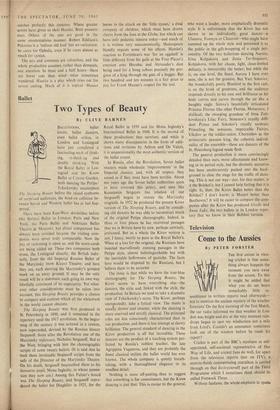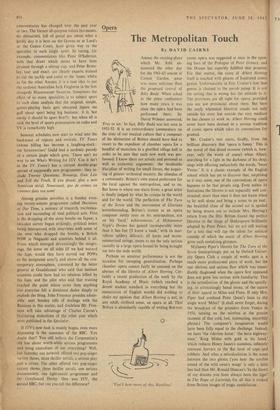Television
Come to the Aussies
By PETER FORSTER
THE first axiom in view- ing cricket is that some- thing always happens the moment you turn away from the screen. To this it might be added that what you do see bears remarkably little re- semblance to written reports read afterwards— not to mention the ancient mystery of the weather forecasts:On the first morning of the Test Match, the car radio informed me that weather in Lon- don was bright and dry at the very moment rain- drops began to spot my windscreen not a mile from Lord's. Couldn't an announcer sometimes look out of the window before he reads his report?
Cricket is part of the BBC's mystique as self- appointed, self-anointed representative of Our Way of Life, and cricket fans do well, for apart from the television reports (not on ITV), a start-to-finish commentating marathon is carried through on that do-it-yourself part of the Third Programme which I sometimes think should be called Fretwork Three.
Without fanfares, the whole emphasis in sports commentaries has changed over the past year or two. The former all-purpose voices (no names, no obituaries), full of genial gas about what a lovely day it is here on the Downs or at Lord's or the Centre Court, have given way to the specialist in each single sport. In racing, for example, commentators like Peter O'Sullevan, with that drawl which seems to have been strained through a stirrup cup, and Peter Brom- ley, taut and exact. are clearly experts trained to cut the cackle and come to the 'osses; whilst as for the other Aussies. it is a neat idea to put the sardonic Australian Jack Fingleton in the box alongside Housemaster Swanton. Sometimes the effect of so many specialists is to subject sport to such close analysis that the original, simple, games-playing basis gets obscured (spare me guff about sport being big business: it is, but surely it should be sport first?): but when all is said, the level of sports presentation on radio and TV is remarkably high.
Summer schedules now start to wind into the backwater of repeats and revivals. TV Times (whose billing has become a laughing-stock: the Screenwriters' Guild had a sardonic parody of a certain jingle which goes, 'There ain't no way to see Who's Writing for ITV 'Cos it isn't in the TV Times') has a current double-page spread of supposedly new programmes: they in- clude Twenty Questions, Bonanza, Gun Law and Tell the Truth, if you please, plus a new American serial. Nouveaute, que de crimes on confine! dans ton nom!
Among genuine novelties is a Sunday even- ing twenty-minute programme called Decisions of Our Time, a mixture of research, recrimina- tion and recounting of vital political acts. First is the dropping of the atom bombs on Japan; a two-shot survey began strikingly, political issues being interspersed with interviews with some of the men who dropped the bombs, a British POW in Nagasaki and scientists behind it all. From which emerged devastatingly the misgiv- ings, the sense on all sides (if we had warned the „Taps, would they have moved our POWs to the designated area?), and above all the con- temporary atmosphere, conveyed by the bitter general at Guadalcanal who said that hesitant scientists could have had no relatives killed by the Japs, and the pilot who said that training reached the point where more than anything else everyone felt a dominant desire simply to explode the thing. John Freeman presides admir- ably; next Sunday tells of dealings with the Russians in this matter, and doubtless Mr. Free- man will take advantage of Charles Curran's fascinating deductions of the other year which were published in the Spectator.
If ITV's new look is mainly bogus, even more depressing is the sameness of the BBC. You doubt that? You still believe the Corporation's old line about worth-while serious programmes and being custodians of our everything? Well, last Saturday one network offered two pop-singer variety shows, three thriller serials, a serious play and a circus. The other offered two pop-singer variety shows, three thriller serials, one serious documentary, one light-music programme and the Greyhound Derby. One was ITV, the second BBC, but can you tell the difference?



































 Previous page
Previous page